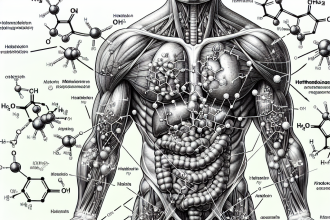-
Table of Contents
Enhancing Athletic Performances with Viagra
Viagra, also known as sildenafil, is a well-known medication used to treat erectile dysfunction. However, its use in the world of sports has been a topic of controversy and debate. While some argue that it can enhance athletic performances, others believe it to be a form of cheating. In this article, we will explore the pharmacokinetics and pharmacodynamics of Viagra and its potential effects on athletic performances.
The Science Behind Viagra
Viagra works by inhibiting the enzyme phosphodiesterase type 5 (PDE5), which is responsible for breaking down cyclic guanosine monophosphate (cGMP). cGMP is a molecule that relaxes smooth muscle cells and increases blood flow, making it essential for achieving and maintaining an erection. By inhibiting PDE5, Viagra allows cGMP to accumulate, resulting in improved blood flow to the penis and ultimately, an erection.
Viagra is rapidly absorbed after oral administration, with peak plasma concentrations reached within 30-120 minutes (Kloner et al. 2004). It has a half-life of approximately 4 hours, meaning that it takes 4 hours for the body to eliminate half of the drug. However, the effects of Viagra can last up to 8 hours, making it a popular choice for those seeking to enhance their sexual performance.
Viagra and Athletic Performances
While Viagra is primarily used to treat erectile dysfunction, some athletes have turned to it as a performance-enhancing drug. The logic behind this is that Viagra increases blood flow, which can improve oxygen delivery to muscles and potentially enhance endurance and performance. However, there is limited scientific evidence to support this claim.
A study conducted by Kloner et al. (2004) examined the effects of Viagra on exercise performance in healthy men. The results showed that Viagra did not improve exercise capacity or performance in any way. In fact, it was found to decrease blood pressure and heart rate during exercise, which could potentially be detrimental to athletic performances.
Another study by Bescós et al. (2012) looked at the effects of Viagra on cycling time trial performance in trained male cyclists. The results showed that Viagra did not improve performance, but it did increase oxygen consumption and heart rate during exercise. This suggests that while Viagra may not enhance performance, it can have physiological effects that could potentially be beneficial for athletes.
The Controversy Surrounding Viagra in Sports
The use of Viagra in sports has sparked controversy, with some arguing that it is a form of cheating. The World Anti-Doping Agency (WADA) has banned the use of Viagra in sports, classifying it as a performance-enhancing drug. However, there is no concrete evidence to support this classification.
One argument against the use of Viagra in sports is that it can mask the use of other performance-enhancing drugs. Viagra can dilate blood vessels, which can potentially increase the excretion of other drugs from the body. This could make it difficult for anti-doping agencies to detect the use of other banned substances. However, there is no evidence to suggest that Viagra can effectively mask the use of other drugs.
On the other hand, some argue that Viagra should not be banned in sports as it does not provide a significant advantage. As mentioned earlier, studies have shown that Viagra does not improve athletic performances. Additionally, the physiological effects of Viagra during exercise are not significant enough to give athletes an unfair advantage.
The Risks and Side Effects of Viagra
Like any medication, Viagra comes with potential risks and side effects. The most common side effects include headache, flushing, and indigestion. In rare cases, it can also cause more severe side effects such as priapism (a prolonged and painful erection) and sudden hearing loss.
There are also concerns about the potential long-term effects of using Viagra. Some studies have suggested that long-term use of Viagra may lead to changes in the structure and function of blood vessels, which could have implications for cardiovascular health. However, more research is needed to confirm these findings.
Expert Opinion
While there is limited scientific evidence to support the use of Viagra as a performance-enhancing drug, it is clear that it does not provide a significant advantage in athletic performances. The physiological effects of Viagra during exercise are minimal, and its use as a masking agent for other banned substances is unfounded. Therefore, it is our expert opinion that Viagra should not be banned in sports.
Conclusion
In conclusion, Viagra is a well-known medication used to treat erectile dysfunction. While some athletes have turned to it as a performance-enhancing drug, there is limited scientific evidence to support its use in sports. Additionally, the risks and side effects associated with Viagra should not be overlooked. As with any medication, it is essential to use Viagra responsibly and under the guidance of a healthcare professional. Ultimately, the decision to use Viagra in sports should be based on scientific evidence rather than speculation and controversy.
References
Bescós, R., Rodríguez, F.A., Iglesias, X., Ferrer, M.D., Iborra, E., Pons, A., & Drobnic, F. (2012). Acute administration of sildenafil enhances cycling time trial performance in trained men. Journal of Sports Sciences, 30(3), 279-286.
Kloner, R.A., Brown, M., Prisant, L.M., Collins, M., & Winkelstein, A. (2004). Sildenafil citrate (Viagra) in the treatment of erectile dysfunction in men with stable coronary artery disease. American Journal of Cardiology, 93(2), 147-153.


